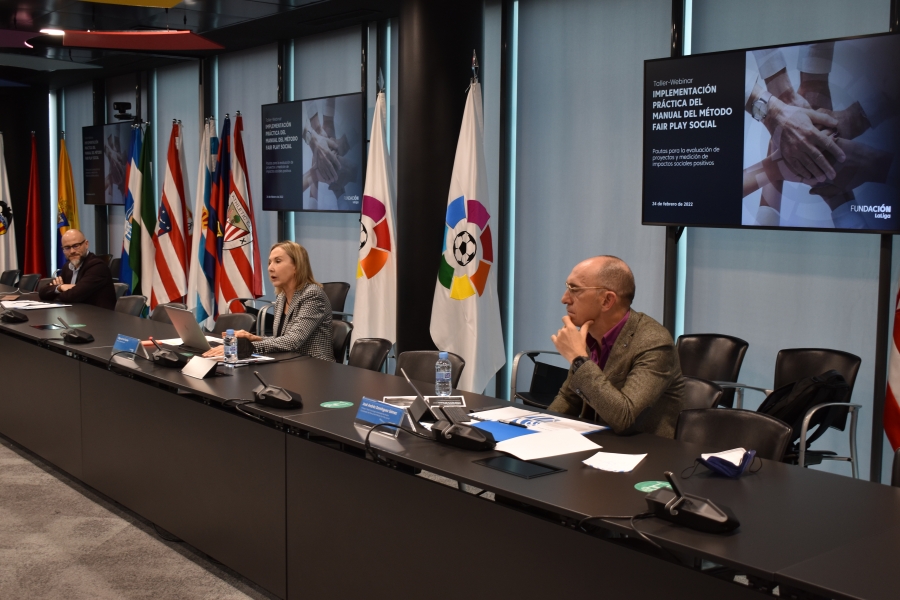
- The Fair Play Social Method launched by the LaLiga FOUNDATION aims to enable organisations in the football industry to integrate the measurement of the social impact of their projects into their strategic plans and to promote actions based on results.
- The alliance between the academic sector and the shared experience of the LaLiga clubs will help the world of football to strengthen its social commitment.
The LaLiga FOUNDATION has published a social impact analysis manual directed at the heads of foundations, corporate social responsibility areas of clubs and other sports organisations to assess the social projects within the football industry. This is an innovative tool for LaLiga Santander and LaLiga SmartBank clubs to strengthen their social commitment within the world of football.
The Fair Play Social Method Manual has been developed taking into account the particularities of the business model, context and challenges of the football industry and is intended to be used as a manual for those responsible for foundations, corporate social responsibility (CSR) areas, as well as for any professional involved in one way or another in the daily management of CSR and sustainability issues. The manual summarises 4 seasons of work with clubs and foundations, which has allowed us to generate a tool from the perspective of the beneficiaries themselves by actively listening to their needs, challenges and experiences.
The manual addresses the key issues and the whole process of measuring the social impact of organisations from designing and planning their projects to the final reporting of the projects, with a focus on positive social impact, as well as the measurement of this impact. The main innovation of the LaLiga FOUNDATION is that it has worked alongside leading university researchers in the sector, from institutions such as the University of Huelva, Cardiff University and the University of Ruhr Bochum, who have integrated the main scientific advances in this field into the methodology.
As a result, the FPS Method has become a system developed from a social and industry impact point of view, which seeks to go a step further in the integration of social projects as a key part of an organisation's business strategy.
Olga de la Fuente, director of LaLiga FOUNDATION explains: “The manual has been developed through the field work led by our organisation through the Fair Play Social project since 2016, mainly through the Social Responsibility "in home" programme with our clubs and foundations. It's a project that is based on collaboration and unity in the social sphere. An exercise in putting in order the conclusions and results of all these years, with a clear look at the evaluation of projects and the measurement of results. As we say in an excerpt from the manual: measure to grow, measure to believe”.
José Andrés Domínguez Gómez, Professor of Sociology at the University of Huelva, editor and co-ordinator of the Fair Play Social Project, says: “In the academic field, we consider it necessary that the wealth of information, data and experiences gathered by the Fair Play Social project developed by the LaLiga FOUNDATION should be converted into a practical methodology”.
Roberto Fernández Villarino, co-author and external coordinator of the Fair Play Social project, adds: “We decided to bring in academic colleagues and researchers from European universities who had developed similar research processes; all of this to deepen the common thread of the method: rigorous and proven results, as well as having a broader vision of the phenomenon of the application of Social Responsibility and Social Development to the football industry”.
The 4 cornerstones of the Fair Play Social Method: measure to grow, measure to believe
The experience of the Fair Play Social team over the last four seasons, and its experience working with the clubs, has helped to consolidate a system of implementation that takes into account the most varied circumstances, and has been consolidated in a series of strategic cornerstones:
1. Diagnosis of the most significant actors. The manual addresses the identification, management and drivers for internal and/or external stakeholders to engage with the organisation on an ongoing basis.
2. Identification of material information. It provides guidelines and tools to identify the most relevant information that a club or organisation should consider as the most relevant pieces of information.
3. Implementation of a social project evaluation methodology. This is vital for refining, optimising and orienting projects towards positive social impacts.
4. Finally, "Measure to believe, measure to grow". Providing the key aspects for measuring the positive social impacts of the organisation: identification of strategic projects to measure and criteria to incorporate into a club's overall strategy.
This manual is a natural extension of the culture of financial sustainability with respect to the good performance of clubs, incorporating social responsibility into the management model by designing indicators adapted to the football industry that allow its players to report on the impact of their decisions. Documenting it in a Manual helps to create a situational map that indicates where the sector stands and what the next steps are.
